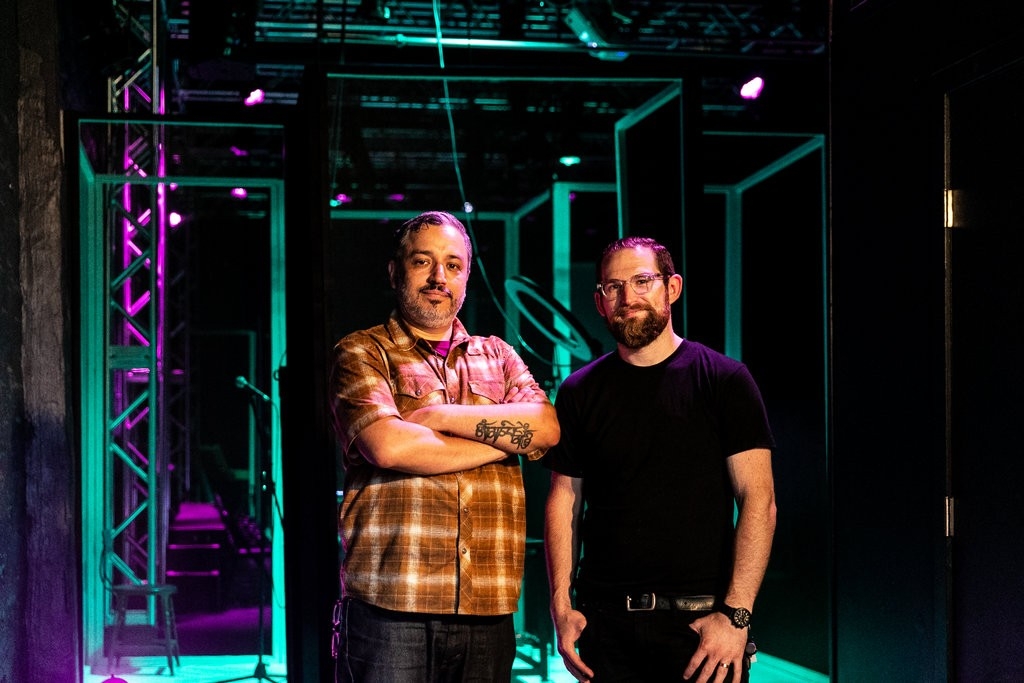This article originally appeared in the New York Times on Sept. 20, 2018.
For over 20 years, the New York-based company Theater Mitu has been creating an experimental body of work that borrows elements from Hinduism and Christianity, Shakespeare and Euripides, Mexican history and state-of-the-art technology. One of its recent productions was a revival of Death of a Salesman in which Happy, Willy Loman’s younger son, was played by a punching bag.
Founded by Rubén Polendo as he was finishing graduate school at the University of California in Los Angeles, the ensemble’s 13 members have traveled all over the world with their shows, and until recently they were also constant travelers in New York: like so many others, a company with no permanent home.
That changed in March, when they moved into a space in Gowanus that they renamed MITU580, after its 580 Sackett Street address.
“We hope growth into the space helps the company grow in every other way,” said Mr. Polendo, the troupe’s artistic director and the chairman of undergraduate drama at New York University’s Tisch School of the Arts.
Located in a mostly residential block in a former glass recycling factory, the loftlike space is being outfitted to house art exhibitions and film screenings as well as theater and dance performances.

For Remnant, its new show, the theater is divided into three booths in which audience members listen to the action through headphones.
Finding a permanent home was always the company goal. In 2011 the group set in motion a strategic plan to create yearly budget surpluses so as to eventually lease and refurbish a space. It cost $150,000 to renovate MITU580; the group has a five-year lease.
“We pinched our pennies for many years to make this first step on our own terms,” said Justin Nestor, the associate artistic director.
The group is the latest arrival to a scrappy collection of new and newish Brooklyn theater spaces that include Jack and the Doxsee, the Sunset Park home for Target Margin.
Unlike traditional companies, Theater Mitu shies away from the term “rehearsal”; instead its members describe two processes, “creation” and “crafting.”
“On a typical creation day, all the artists come into the room and instead of working together we all work on individual projects,” Mr. Nestor explained. “I will take photographs and research and create a piece. Then the group sees it and we turn it upside down, then another member will do the same.”
Rather than remounting a piece, Theater Mitu decided to create something new to inaugurate its space. The result is Remnant, an installation performance running through Sept. 21 that takes “The Mahabharata” as a starting point to ruminate on war, loss, and what is left behind.

Michael Littig in one of the three portions of Remnant.
Audience members are clustered in front of three different booths, each featuring performers who use songs, poems and interview excerpts to try and convey the nature of “what remains.” In one a war veteran is coping with PTSD; in another a hospital patient has lost the power of speech.
The experience is a bit otherworldly, though, thanks to eerie lighting and the sound design: Audience members sit in silence and listen to the performance through headphones. Mr. Polendo described the setting as “a space of memory,” along the lines of Dia de los Muertos altars, through which spirits communicate their deepest longings.
“We’re taking you through a ritual,” he added.
Death can often be an uncomfortable subject in the United States, but it is handled differently among Latinos, he pointed out.
“In Latin America we acknowledge death and ancestors,” Mr. Polendo said. “A conversation around death and mortality isn’t something that would bring a room down, but bring a greater sense of purpose to the conversation.”
Along with its philosophical and spiritual layers, “Remnant” requires technical sophistication. Performers in all three booths need to stay in sync so that each segment ends at the same time; they wear earpieces through which they’re fed their original text, as well as stage directions.
Mr. Nestor compared it to an out-of-body experience. “I’m hearing something before I say it, but because the microphone is also fed to my ear I hear it again said back to me,” he said. “There is something existential about me from the past speaking to me from the present and then having that reflected back to me through the microphone.”
“It’s almost like a mantra,” he added.
